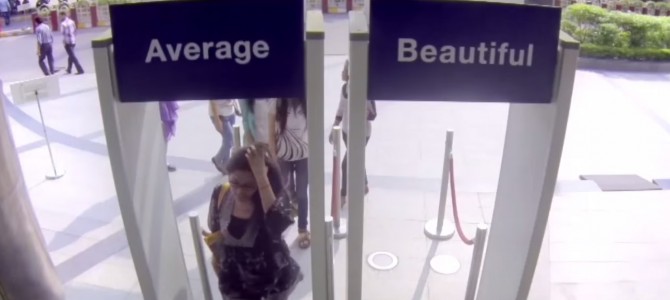The newest ad campaign from Dove depicts a series of women in various international locales approaching a retail establishment with two doors, one marked “Average” and the other “Beautiful.” As the women consider which door to enter, some appear to stop and debate, others readily choose a door, and still others turn and walk away rather than choose. The video ends with woman after woman assertively entering through the “Beautiful” door, then talking about how it made her feel to do so.
The intended message seems to be that beauty is a mental state, and if you feel beautiful—indicated by entering through the “Beautiful” door—you are beautiful. Of course, if after watching the video you also go out and buy Dove products, all the better.
Thanks, Dove
I will admit that the video got to me. As one who was repeatedly called ugly in junior high (I was the stereotypical buck-toothed, acne-prone, freckle-faced redhead), I have struggled for a long time with insecurity about my appearance. I would love nothing more than to feel confident enough to enter the “Beautiful” door. My husband, bless his heart, tells me I am beautiful. But if I were one of the ladies in the video I am pretty sure I would not have hesitated before decisively heading through the “Average” door.
So, on the one hand, I applaud the sentiment behind the campaign. Women today are bombarded with unrealistic images of beauty. Those flawless faces and perfectly sculpted bodies we see on the covers of fashion and entertainment magazines have most likely been carefully photo-shopped to erase any and all imperfections. While there is the occasional cultural push-back (most recently from Lane Bryant), our working definition of modern beauty continues to be driven more by Miss America than by middle America.
We give lip service to ideals of diversity and acceptance of a wide array of physical types, but continue to teach our children, in words and actions, a much narrower definition of what beauty is. With that in mind, I appreciate what Dove seems to be trying to do.
But Not a Hearty Thanks
There is another part of me, however, that bristles at the ad, because in trying to convince female consumers that they, too, can choose the “Beautiful” door, the campaign ends up sending the message that there is something wrong with being merely “Average.”
But the fact is that some people are better-looking than others, and we all know it. The ancient Greeks figured it out two millennia ago, and identified objective reasons for it having to do with order, form, and proportion. Why, then, are we so reticent these days to acknowledge it? It strikes me as yet another manifestation of the well-meaning but misguided self-esteem and positive thinking movements of the last few generations.
Our cultural mantras of “Build it and they will come” and “If you can dream it, you can do it” have become a social gospel that one best not question if he doesn’t want to be pegged as a vision-less, nay-saying grouch. We tell children they can do anything they set their minds to, but can they? I would have loved nothing better than to be the next Barbra Streisand. But I could have pursued that goal until the cows came home—it wasn’t gonna happen.
When we tell our children that any goal is within their grasp if only they want and pursue it enough, we not only mislead them and create unrealistic expectations for their future, we suggest that a life as a regular person doing regular things is not worth having. When we tell women that it’s not enough to be okay-looking—that they must believe they are beautiful and convince everyone else of the same—we imply that their worth is a function of their physical beauty.
At a time in which those who are disabled, sick, old or unborn are increasingly seen as expendable, I would prefer a different message: whether you are beautiful or homely, athletic or uncoordinated, strong or weak, intellectually gifted or of average IQ, there is a door for you. It’s called “Human,” and when any man, woman, or child can walk proudly through it and meet up with respect and consideration on the other side, then we will have truly achieved something.









